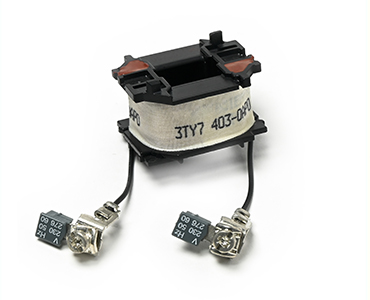
MCB Coils
MCB Coils


MCB Coils (Miniature Circuit Breaker Coils) are crucial components within the structure of Miniature Circuit Breakers (MCBs), which are widely used for protection against overcurrent in electrical circuits. These coils play an essential role in detecting overcurrent or short circuit conditions and triggering the mechanism to break the circuit and prevent damage to the electrical system or connected devices.
MCB Coils are electromagnetic components used in MCBs to sense overcurrent situations. The coil generates a magnetic field when an electrical current flows through it. When the current exceeds the safe limit (overcurrent or short circuit), the coil activates a mechanical trigger that disconnects the circuit, preventing damage or fire hazards. The coil in an MCB is typically part of the electromagnetic trip unit, which is responsible for actuating the breaker mechanism and safely interrupting the circuit in case of excessive current.
Working Principle
- Overcurrent Detection: The MCB coil is designed to detect when the current exceeds a predefined threshold. It operates by generating a magnetic field proportional to the current flowing through it.
- Electromagnetic Action: When the current surpasses the set threshold (due to a fault like a short circuit or overload), the magnetic field generated by the coil becomes strong enough to pull a plunger or lever mechanism. This action trips the MCB, disconnecting the circuit.
- Thermal and Magnetic Trip: MCBs often have both thermal and magnetic trip mechanisms. The thermal part protects against prolonged overcurrent, while the magnetic part protects against sudden short circuits or excessive currents.
Key Features of MCB Coils
- High Sensitivity: MCB coils are designed to be highly sensitive to changes in current, ensuring prompt response to any overcurrent situation.
- Durability: MCB coils are built to last for numerous operations, typically with a long operational life under normal working conditions.
- Compact Design: These coils are designed to fit within the compact housing of the MCB, making them suitable for space-limited applications.
- Fast Response Time: MCB coils react quickly to sudden overcurrent conditions, ensuring the safety of the electrical system by disconnecting the circuit before any significant damage can occur.
Applications of MCB Coils
- Residential Electrical Systems: MCB coils are used in homes to protect circuits from overload and short circuits, ensuring the safety of electrical appliances and wiring.
- Industrial and Commercial Applications: MCBs with coils are widely used in factories, offices, and commercial buildings to protect equipment and electrical installations from damage due to overcurrent.
- Power Distribution Systems: MCB coils play an important role in power distribution networks to provide overcurrent protection for lines and equipment.
- Automotive Electrical Systems: In automotive circuits, MCB coils are used for overcurrent protection to safeguard sensitive electrical components within the vehicle.
- Solar Power Systems: MCBs equipped with coils are used in photovoltaic (solar) systems to protect electrical circuits from overcurrent, ensuring safe operation and longevity of the system.
Advantages of MCB Coils
- Increased Safety: By providing quick detection and disconnection in the event of a fault, MCB coils significantly reduce the risk of fire or damage caused by electrical faults.
- Cost-Effective: MCBs, including their coils, are relatively low-cost protective devices that offer a reliable solution for circuit protection.
- Easy to Reset: After an MCB trips, the breaker can be easily reset once the fault is cleared, providing an efficient solution for managing electrical overloads or faults.
- Compact and Versatile: MCBs, and their coils, are designed to fit into compact enclosures, making them suitable for use in various applications, from small residential systems to larger industrial installations.
